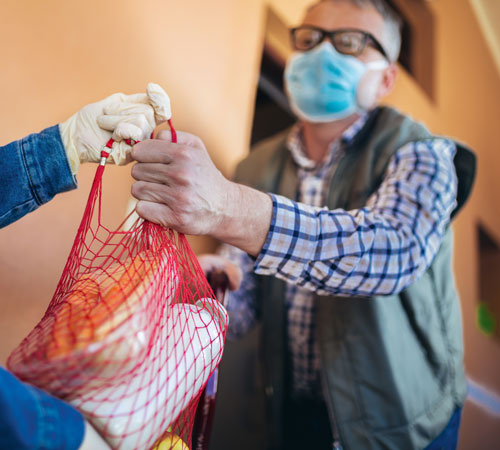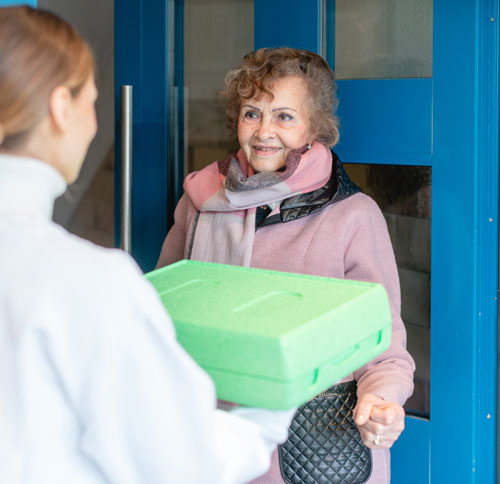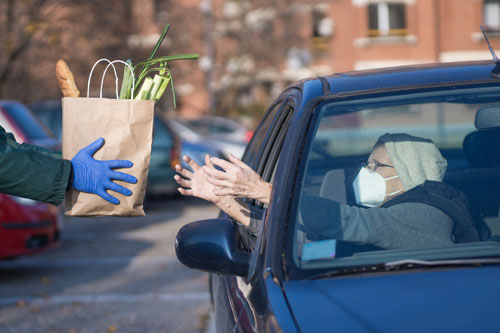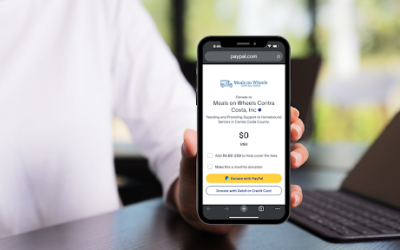COVID-19 made specific populations, like seniors, even more vulnerable than they ever were before.
Before and during the pandemic, the food assistance community, both public and nonprofit, addressed food security among older adults in many different ways. These methods have had to adapt and grow to meet the high number of seniors needing assistance.
To understand food insecurity among older adults, with must all understand the impact before the pandemic and where we all are now. That way, we all can provide the necessary assistance that our seniors need.
Food Insecurity Before the Pandemic 
Unfortunately, food insecurity among older adults has always been a problem. It’s estimated that pre-pandemic in 2019, 7.1% of the seniors in the United States faced some form of food insecurity.
Millions upon millions of seniors each year were struggling with affordable food, often because of circumstances out of their control. Many of these circumstances include:
- Chronic medical conditions that require intensive time and money
- Veterans who suffer from service-related injuries who rely only on state-funded assistance
- Lack of affordable housing or availability of housing in rural places
- Presence of racism and racial discrimination towards minority groups
- Low income or sudden unemployment
One of the primary reasons for food insecurity, lower income, is the result of many seniors living only on social security. Seniors living on a fixed income are more susceptible to inflation in food prices because they often are not able to change their budgets or find lower prices in more rural areas. Financial strain is often the number one cited cause of many leading causes of stress, mental unwellness, and the ability to buy food.
There always have been programs that existed, like the California Food Assistance Program, that did help seniors who met the qualifications. Part of the food stamp program allows for non-citizens to receive support through the state government. Another program always available is the California supplemental nutrition assistance program, where those eligible can receive food education, community resources, and nutrition assistance.
With the onset of the COVID-19 pandemic, many of these problems made food insecurity among older adults even more problematic.
Food Insecurity During the Pandemic 
COVID didn’t cause food insecurity in the United States: it just made the problems worse. Many seniors lost their jobs and income, lost family members, became isolated from their peers, or became permanently ill before the vaccine was developed. What COVID did was, make many of these problems more visible, especially the impact isolation has on a senior’s mental health.
COVID also introduced an element that didn’t exist before in food security: a deep-seated fear that going to get food could make you sick, whether at a grocery store or a restaurant. Particularly with the appearance of the highly contagious Omicron COVID variant, many seniors are scared to go grocery shopping.
Seniors who had mobility problems could potentially have relied on grocery delivery services to get their food. But, even then, there wasn’t as much availability of these services. There was also the additional cost the senior had to consider, which could have broken their budget.
Now that even with grocery delivery services more popular, just going to the grocery store has become yet another activity that seniors are limited by. What could have been a social activity is now something that could make them sick.
The Meals on Wheels COVID- 19 Response 
The impact of the Meals on Wheels program has been studied, and the help that programs all across the United States truly make a difference in a senior’s life. Meals on Wheels of Contra Costa and our partners exist to combat food insecurity in more rural areas like Richmond, Concord, Antioch, and Porta Costa.
Since Meals on Wheels has always been a nutrition assistance program, our partners were able to adapt during the pandemic to keep everyone safe.
Instead of delivering fresh, nutritionally balanced meals daily, our partners switched to weekly frozen meals. The same quality is offered, but in a way that the senior can consume the meal while staying safe. This was also kept the delivery drivers safer, as they had less contact with a vulnerable senior.
The wellness and health checks became less frequent, but when the drivers were able to interact with the seniors on their route, the checks were even more critical.
The Contra Costa Senior Meals Program
The Contra Costa Senior Meals Program is available for seniors who are homebound and are sixty years or older. Homebound means that they are unable to participate in daily and instrumental activities. If you have a loved one or know someone who could benefit from our partner’s services, please contact the appropriate organization from this list.
If reading this blog has inspired you to help our community by providing healthy meals for seniors delivered right to their doors, contact us here for ways you can get involved!






